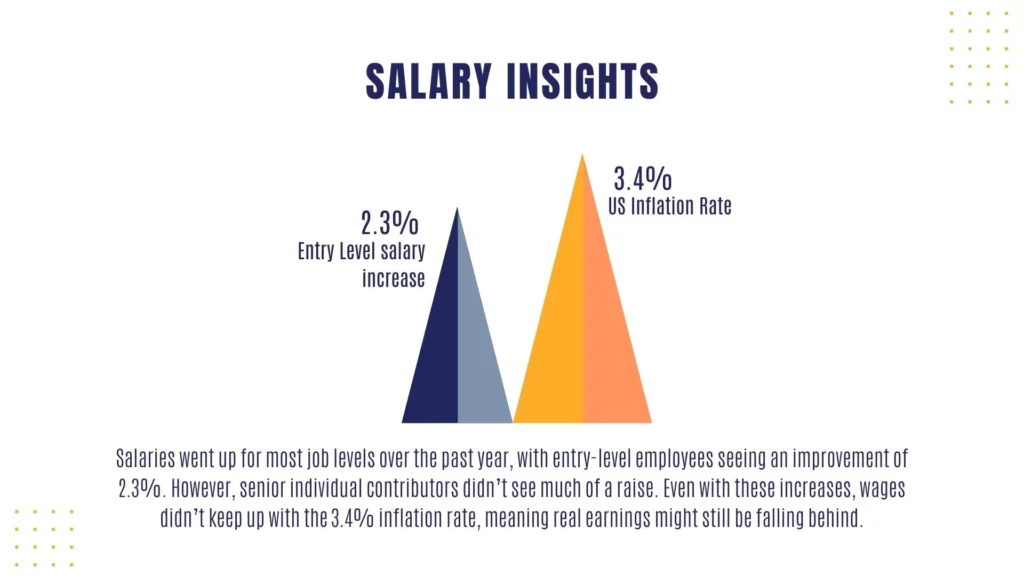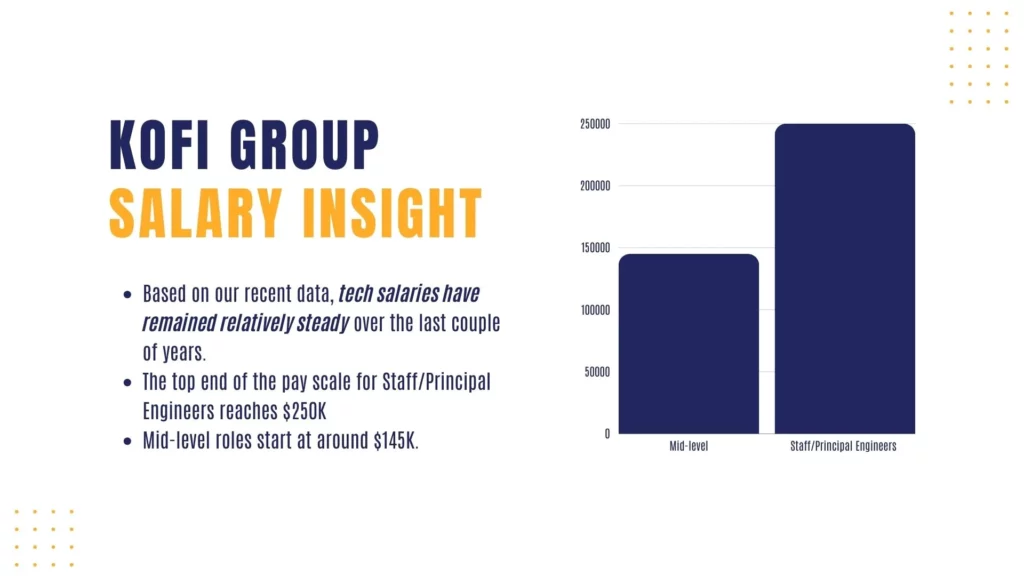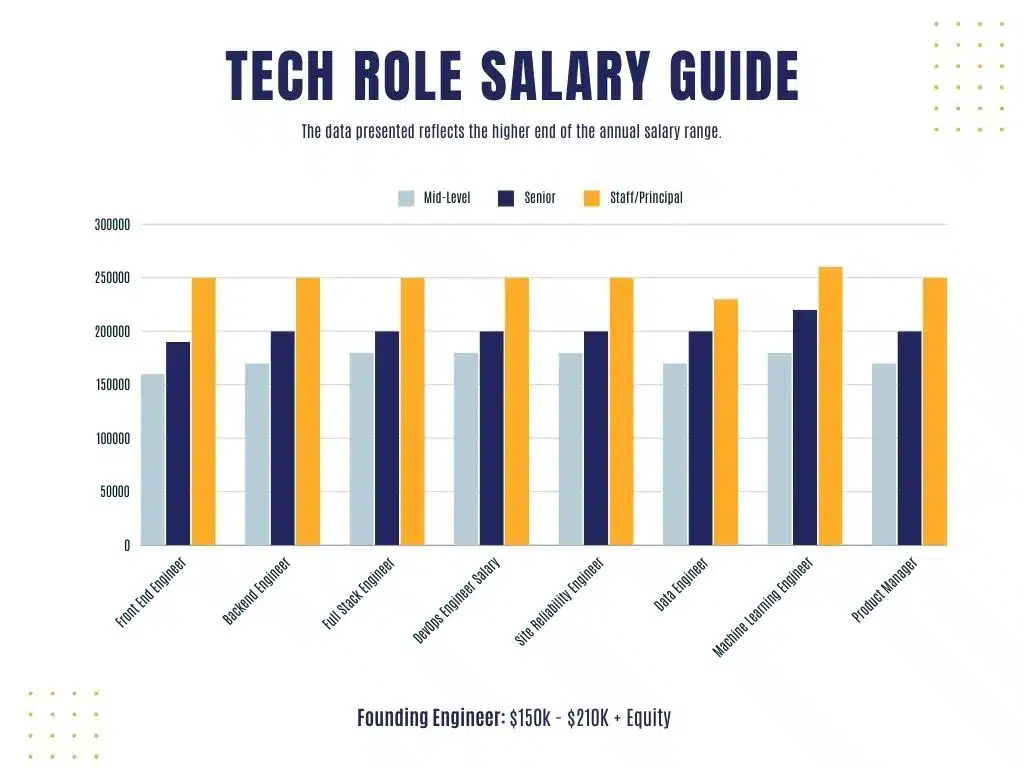Tech Salary Guide for Startups

Hiring tech talent for your startup is exciting but challenging—especially when figuring out how much to pay. Offering competitive salaries can make or break your ability to attract top-notch talent.
This guide gives you a snapshot of what to expect when hiring for key tech roles at startups.
Data Backed by Real Conversations
The salary insights we share come from our years of recruitment experience and countless conversations with tech candidates in major startup hubs like San Francisco, New York, and Boston.
This info gives us a real feel for current salary trends, market needs, and what’s driving pay in the tech world. Our close connection with talent ensures our data is up-to-date and helps startups stay competitive when it comes to hiring.
Important Note:
Our data is based on startups from seed stage to Series C. Keep in mind that pay can vary depending on the company’s stage, location, and a few other factors.
Benefits of a Salary Guide to Startups
Smart Hiring: A salary guide helps startups offer competitive pay which makes it easier to attract top talent. Knowing the going rate for different roles lets you make solid offers without overspending.
Budgeting: It allows startups to plan their hiring budget more accurately while keeping costs in check while growing the team. Understanding salary ranges helps spread resources across departments efficiently.
Retention: Offering competitive salaries is key to keeping your best employees. A salary guide helps prevent underpaying staff, reducing turnover and creating a more stable team.
Fairness & Transparency: It ensures pay transparency and fairness across the company. This builds trust within the team and helps meet legal requirements around compensation.
Negotiation Support: Salary guides are a great reference for negotiations. It gives founders confidence when discussing pay with candidates or current employees.
General Data and Statistics
According to Carta, Employee salaries improved over the past year, with most job levels experiencing pay increases between May 2023 and April 2024. Entry-level employees benefited the most, with their salaries rising by 2.3%.
However, senior individual contributors were the exception, seeing no notable gains. Despite these increases, wages across all levels still lagged behind inflation, which was 3.4% in the U.S. during the same period.

Salary Trends & Key Factors Affecting Compensation in Tech Roles
Based on our data, the salaries of tech roles have remained relatively steady over the last couple of years. The top end of the pay scale for Staff/Principal Engineers is at $250K. On the other hand, mid-level roles start at around $145K.
There is a lot of variation in the data due to several factors, but overall, the salary ranges for all roles are quite similar.

Factors That Impact Salary:
Stage of the Startup: Seed stage startups tend to offer lower cash compensation but provide the highest equity stakes. As startups grow, cash salaries typically increase while equity offerings decrease.
Location: Geography plays a huge role in salary differences. Startups in cities like San Francisco, New York, and Boston offer the highest salaries, while those in Austin, Seattle, and Chicago typically pay less by comparison.
Years of Experience: There are two major groups. Employees with less than 5 years of experience generally earn less, but after crossing the 5-year mark, compensation becomes less tied to years worked and more to the value and impact they bring to the company.
Specific Skillsets: High-demand skills command premium salaries. Engineers skilled in Distributed Systems, Machine Learning, Full Stack Development, and Cloud Computing are among the highest paid in the industry.
Shift from Location-Based Pay to Skill-Based Pay
Before COVID, salaries were largely influenced by location—employees in major cities or tech hubs often earned more due to the cost of living. However, with remote work becoming the new norm, compensation is now less tied to geography and more focused on a candidate’s experience, skill set, and the value they bring to the company.
This shift allows startups to tap into a broader talent pool while offering competitive salaries based on expertise rather than location.
Tech Roles Salary Guide
We rounded the numbers up or down to keep things simple. This makes it easier to spot key trends without getting lost in overly specific figures.
1. Front End Engineer
Front end engineers are the creators of what users see and interact with on your website or app. They’re essential to creating seamless user experiences, so they’re always in demand.
- Mid-level: $150k – $160k
- Senior: $160k – $190k
- Staff/Principal: $200k – $250k
2. Backend Engineer
Backend engineers are responsible for the server side of things, handling databases, APIs, and the logic behind your app. Their work makes sure your product runs smoothly.
- Mid-level: $160k – $170k
- Senior: $180k – $200k
- Staff/Principal: $200k – $250k
3. Full Stack Engineer
Full Stack Engineers are the jack-of-all-trades—they handle both frontend and backend tasks. This versatility makes them a highly sought-after role, especially for startups.
- Mid-level: $170k – $180k
- Senior: $180k – $200k
- Staff/Principal: $200k – $250k
4. DevOps Engineer
DevOps Engineers help bridge the gap between development and operations, streamlining processes to improve efficiency. They ensure your product gets deployed smoothly and on time.
- Mid-level: $160k – $170k
- Senior: $180k – $200k
- Staff/Principal: $210k – $250k
5. Site Reliability Engineer (SRE)
SREs are responsible for ensuring that your systems remain reliable and efficient. They balance operational tasks with development work. They’re critical for keeping your infrastructure running smoothly.
- Mid-level: $160k – $180k
- Senior: $180k – $200k
- Staff/Principal: $200k – $250k
6. Data Engineer
Data engineers create and manage the architecture that supports data storage and analysis. Startups rely heavily on data to drive decisions, making this role important.
- Mid-level: $150k – $170k
- Senior: $180k – $200k
- Staff/Principal: $200k – $230k
7. Machine Learning Engineer
Machine Learning Engineers build algorithms that allow machines to learn from data. If your startup is leveraging AI or predictive analytics, this role is a must-have.
- Mid-level: $160k – $180k
- Senior: $180k – $220k
- Staff/Principal: $220k – $260k
8. Product Manager
Product Managers act as the bridge between the tech team and the business side, ensuring that what’s being built aligns with the company’s goals and customer needs.
- Mid-level: $150k – $170k
- Senior: $170k – $200k
- Staff/Principal: $210k – $250k
9. Founding Engineer
Founding Engineers are the first technical hires at a startup. They wear many hats and help set the foundation for the product and engineering culture. Compensation is often a mix of salary and equity, making it a unique role.
- $150k – $210k + Equity
- Founding Engineer roles have the widest salary ranges, but they’re usually on the lower end because there’s a bigger emphasis on equity.

Wrapping It Up
Whether you’re hiring your first developer or expanding your team, offering competitive salaries is crucial to landing the best talent. Keep in mind that these figures are rough ranges, and salaries can fluctuate depending on your company’s stage, the engineer’s experience, and any unique market dynamics.
Make sure to consider equity and other benefits to sweeten the deal and attract long-term players to your startup. After all, building a strong team isn’t just about the paycheck—it’s about building something together.
Share This Blog
Kofi Group has helped 100+ startups hire software and machine learning engineers. Will fill most of the roles we recruit on with 5 or less candidates presented.
Contact us today to start building your dream team!


